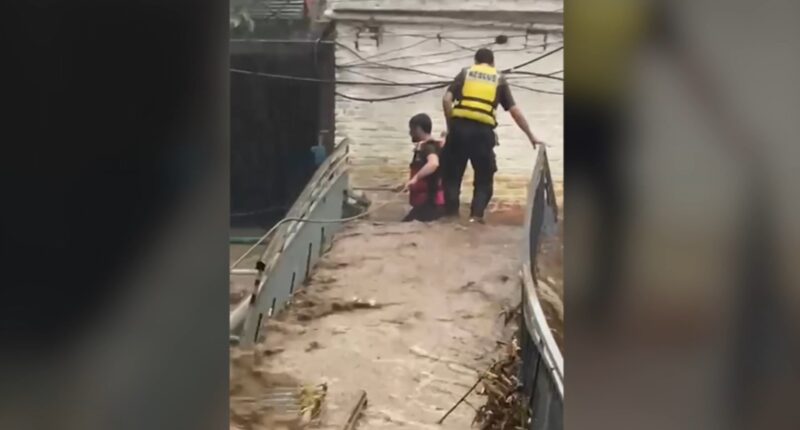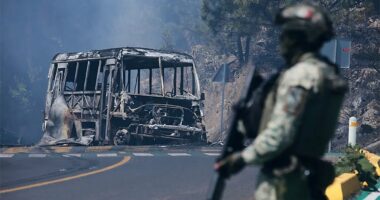Share this @internewscast.com
In PESHAWAR, Pakistan, distressed locals combed through isolated regions for the bodies of people swept away by flash floods over the weekend, as the death count rose to 277 on Monday. In response to complaints about the absence of evacuation alerts, one official remarked that people should have constructed their homes in different locations.
A changing climate has made residents of northern Pakistan’s river-carved mountainous areas more vulnerable to sudden, heavy rains.
More than 150 people were still missing in the district of Buner in Khyber Pakhtunkhwa province after Friday’s flash floods.
According to villagers, no warnings were delivered through mosque loudspeakers, a common method for conveying urgent news in secluded areas. The government argued that the intense and rapid rainfall left them no time to warn the residents before the deluge occurred.
Emergency services representative Mohammad Suhail announced that three bodies were discovered on Monday. In response to the disaster, the army has deployed engineers and heavy machinery to remove debris.
On Sunday, the provincial chief minister, Ali Amin Gandapur, stated that many fatalities could have been prevented if people had avoided building homes along waterways. He mentioned that the government plans to motivate displaced families to move to safer regions, where they would receive support in rebuilding their homes.
Some residents insisted they did not live near streams, yet the flood ravaged their homes. In Buner’s Malak Pur village, 55-year-old Ikram Ullah recounted how generations-old homes were destroyed, even though they weren’t located near the streams, which had unexpectedly formed due to the flood. He reported that large boulders had tumbled down from the mountains during the flood.
In the badly affected village of Pir Baba, shopkeeper Shaukat Ali, 57, lost his grocery store to the floodwaters. He noted that his business wasn’t situated near a river or stream, despite standing for years among numerous other shops in the bazar. “It pains us when people say we suffered because we lived along the waterways,” Ali said to The Associated Press.
Pakistan has seen higher-than-normal monsoon rains since June 26 that have killed at least 645 people across the country, with 400 deaths in the northwest. The National Disaster Management Authority issued an alert for further flooding after new rains began Sunday in many parts of the country.
In a statement, the military said the Pakistan Air Force played a key role in flood relief operations by airlifting 48 tons of NGO-provided relief goods from the port of Karachi to Peshawar, the regional capital. It said the air force established an air bridge to ensure the swift delivery of supplies.
On Monday, torrential rains triggered a flash flood that struck Darori village in northwestern Swabi district, killing 15 people, government official Awais Babar said.
He said rescuers evacuated nearly 100 people, mostly women and children, who had taken refuge on the roofs of homes. Disaster management officials said the floods inundated streets in other districts in the northwest and in Pakistan-administered Kashmir.
Prime Minister Shehbaz Sharif chaired a high-level meeting Monday to review relief efforts in flood-hit areas of Khyber Pakhtunkhwa as well as northern Gilgit-Baltistan and Pakistan-administered Kashmir.
At the meeting, officials estimated flood-related damages to public and private property at more than 126 million rupees ($450,000), according to a government statement.
The U.N. humanitarian agency said it had mobilized groups in hard-hit areas where damaged roads and communication lines have cut off communities. Relief agencies were providing food, water and other aid.
Flooding has also hit India-administered Kashmir, where at least 67 people were killed and dozens remain missing after flash floods swept through the region during an annual Hindu pilgrimage last week.
In 2022, catastrophic floods linked to climate change killed nearly 1,700 people in Pakistan and left hundreds of thousands homeless.
Associated Press writers Ishfaq Hussain in Muzaffarabad, Pakistan, Rasool Dawar in Peshawar, Pakistan, and Munir Ahmed in Islamabad contributed to this story.
Copyright © 2025 by The Associated Press. All Rights Reserved.

















